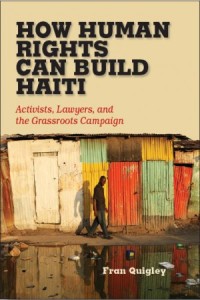There is a powerful saying in Haitian Creole: Konstitisyon se papye, bayonet se fè. (“The constitution is paper, the bayonet is steel.”) It reflects the fact that simply securing rights on paper is never enough. Rather, any human rights campaign must grapple with issues of power as much as it does with issues of law. That begins with creating popular pressure to even get to the metaphorical “day in court.” And it continues after the people have won their hard-earned “paper” rights.
In short, successful human rights work requires building a social movement.
This perspective permeates the pages of Fran Quigley’s new book, How Human Rights Can Build Haiti. It is fundamentally a book about the “rule of law.” But as longtime followers of this blog know, “rule of law” rhetoric has historically been deployed to justify horrendous abuses of power in Haiti.
That’s part of why this book deserves a wide audience. It recognizes that Haiti’s material hardship is exacerbated because they can’t enforce their rights (ranging from political sovereignty to business contracts to labor rights).
But Quigley doesn’t call on the military or UN peacekeepers to secure those rights at gunpoint, which is the typical international community approach (and which, unsurprisingly, often results in violating more rights than it secures). Rather, he recognizes that those rights must be articulated in a way that reflects commonly held values, and enforced by civil society as well as institutions of law.
Leading “the Struggle” – Grassroots Human Rights Advocacy
Enter Mario Joseph and Brian Concannon, the protagonists of this book, who are integral to both the legal and grassroots branches of this fight in Haiti. They are the heads of Bureau des Avocats Internationaux (BAI) and the Institute for Justice And Democracy in Haiti (IJDH), respectively. Quigley’s book documents their work to advance the rights of everyday Haitians, and shines a light on several of the actors and systems that persistently lead to gross violations of those rights.
Rather than beginning with the familiar rundown of Haiti’s travails, Quigley mainly focuses on key dimensions of this struggle:
- Holding the UN accountable for introducing cholera to Haiti;
- Prosecuting the recently returned dictator and strongman, Baby Doc Duvalier;
- Fighting for civil and criminal justice reform (i.e., the “rule of law”);
- The successful trial in 2000 of 59 coup and militia leaders who perpetrated a massacre of pro-Aristide demonstrators;
He gives ample attention to the “beyond-the-courtroom” strategy for raising the profile of these issues, changing the terms of the debate, and increasing the resilience of civil society.
As a result, this book is a welcome contribution to the burgeoning literature on post-quake Haiti. First, because it focuses on the agency of everyday Haitians in the face of various oppressors. And second, because it marries granular detail about the struggle on the ground with awareness of the international mechanisms that perpetuate inequality and rights violations in Haiti.
Event Details: Fran Quigley to Minnesota
Thus, it is with great pleasure that we announce Fran Quigley will be joining the Haiti Justice Alliance in Minnesota for a series of events in Northfield and Minneapolis.
Quigley is a law professor at Indiana University, where he teaches in the Health and Human Rights Clinic. In addition to working in human rights advocacy, much of his scholarship focuses on the intersection between building human rights/rule of law and social movement principles.
As such, he is well-positioned to peel back the layers and give a holistic portrayal of the inner workings of Haiti’s human rights struggle. We hope you’ll join us for one of the events listed below.
Minneapolis – Wed., Oct. 22
University of Minnesota:
- Building Human Rights in Haiti: Book Event
4:30 PM, 235 Blegen Hall
Northfield – Thu., Oct. 23
Carleton:
- Coffee with Prof. Quigley: a chance to explore career paths and human rights work
9:00 AM, Sayles-Hill 252
St. Olaf:
- Lunch with Prof. Quigley: Building Human Rights in Haiti + conversation
11:00 AM, Sun Ballroom, Buntrock Commons 3rd Floor
Carleton:
- How Human Rights Can Build Haiti
4:30 PM, Leighton 305
For other opportunities to connect with Prof. Quigley, or questions about these events, contact Natalie Miller at mill5118@umn.edu.



 Posted by Nathan Yaffe
Posted by Nathan Yaffe 


